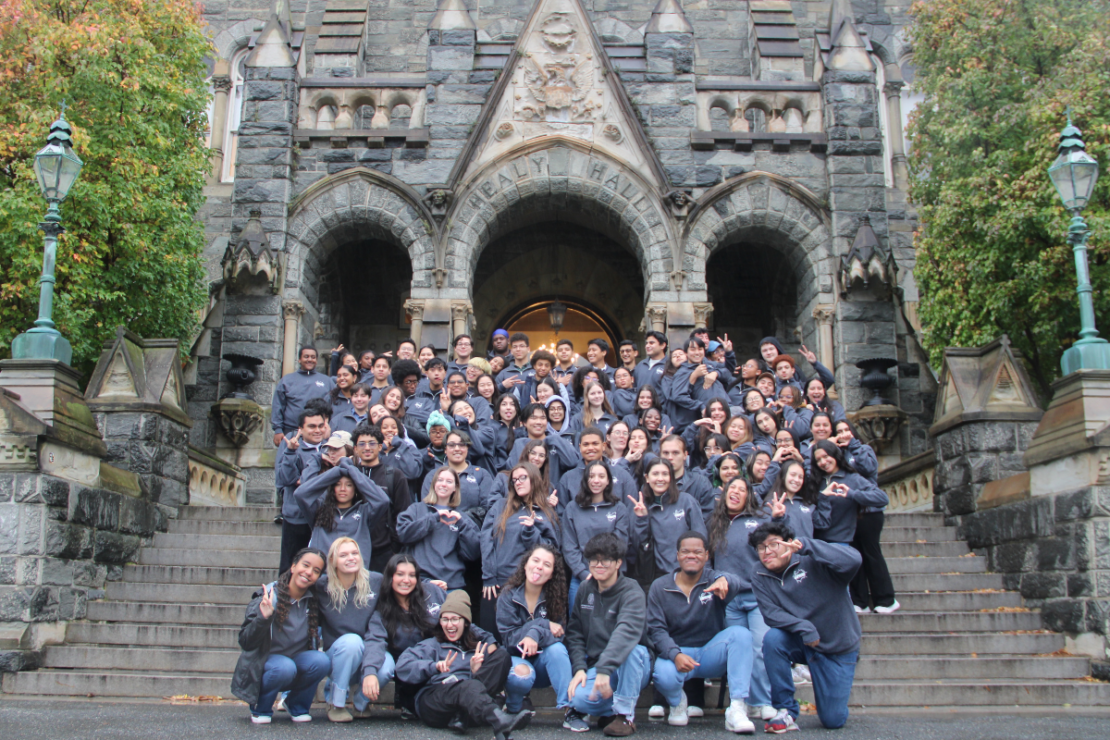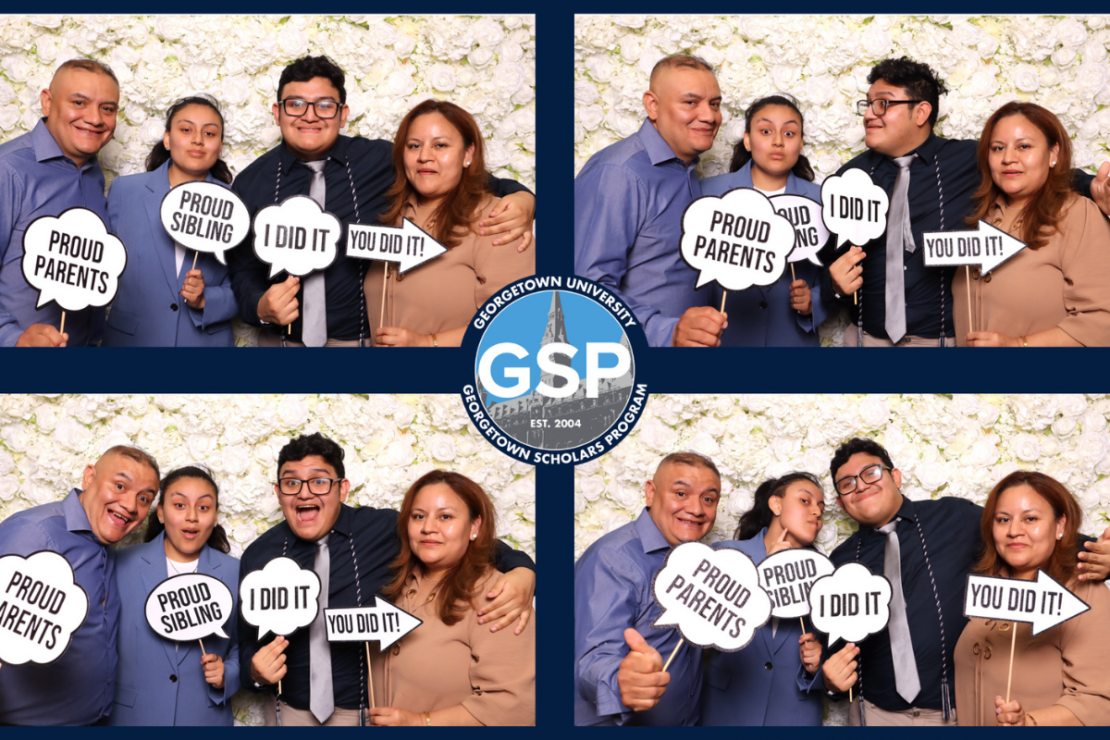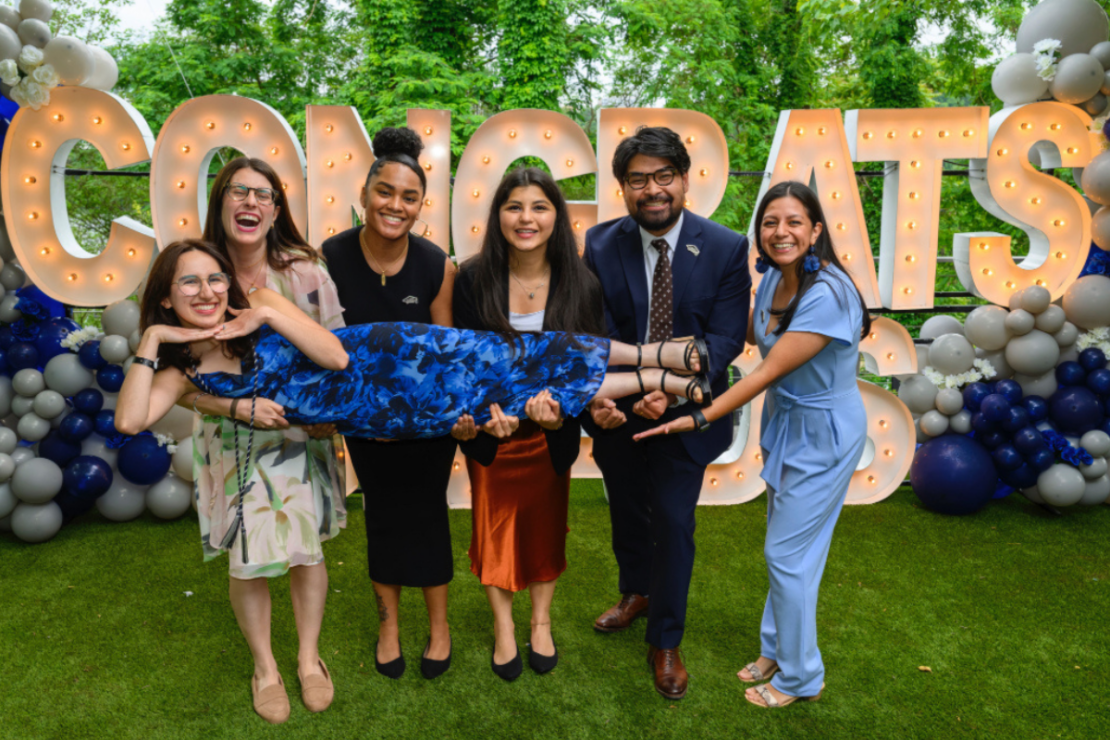
This year, the Georgetown Scholars Program (GSP) celebrates its 20th year, having provided robust wraparound support and a welcoming community for more than 2,600 first-generation college students and students from low-income households. The program heads into its third decade atop a strong foundation: with philanthropic support from alumni and friends, GSP has established endowed funds to sustain the program’s foundational operations and Necessity Fund in perpetuity.
“GSP’s success is as a community-driven effort that positions students to show up as their full selves in the classroom, in their dorms, and in their internships,” says Melissa “Missy” Foy, GSP executive director. “Graduates are now working in the White House, in the foreign service, at NBC and Netflix, in nonprofits, getting their PhDs, and running for office and winning elections. The world is better when our students are able to bring their lived experiences to these leadership positions.”
Creating a more equitable experience
Launched in 2004 as an effort to make Georgetown more inclusive for first-generation and low-income students, GSP currently serves over 650 undergraduate students. The program seeks to create a more equitable educational environment in the Jesuit tradition of cura personalis, or care for the whole person, which calls upon the entire university to ensure a quality Georgetown education is accessible to all its students, particularly those from underrepresented backgrounds.
Related: ‘It felt like Georgetown was built for us’: First-gen student reflects on his GSP experience >
GSP’s model combines advising, mentorship, professional development, community building, specialized programming, and microgrants to help Georgetown students thrive on campus and after graduation. The program’s graduation rate for first-generation students is 94%, compared to a 26% national bachelor’s attainment rate among first-generation U.S. college students.
“The Georgetown Scholars Program made my personal development here at Georgetown possible,” says Daniella Passariello (SFS’24), a Magna Cum Laude graduate from the Walsh School of Foreign Service and McDonough School of Business who earned a degree in Business and Global Affairs and a minor in Environmental Studies. “They are the backbone of all the achievements I have been able to accomplish on campus and beyond.”

Related: ‘I just felt like Georgetown was going to be home’ >
Comprehensive programmatic support
To enable students to more fully participate in campus life, GSP organizes programs and social events and connects scholars to an active alumni network, mentors, and peers so they have access to a thriving community that supports them throughout their four years at Georgetown.
The program also helps demystify the unspoken expectations of higher education, recognizing that the transition to college can prove especially jarring for first-generation students. Through a 12-week, two-credit course called Mastering the Hidden Curriculum, GSP equips students with the skills and cultural capital to successfully navigate the college environment, empowers them to confidently pursue their academic and career goals, and allows them to have a deeper understanding of their own identities.
Related: ‘After taking that class, your perspective on everything changes’ >
GSP is one of several programs Georgetown has developed to support students in fully embracing their college experience. Approximately half of the GSP student community also has the opportunity to participate in the Community Scholars Program, a five-week academic program on Georgetown’s campus that begins even before their first year of college. This unique program, founded in 1968 during the Civil Rights Movement, helps students in their transition to a new higher education environment. This summer, the program will welcome 88 first-year students—its largest class ever—to the Hilltop campus and looks forward to ongoing growth.
A ‘model program’ for providing emergency aid
Through a Necessity Fund, GSP also provides modest grants to students encountering unexpected, out-of-pocket expenses. The program distributes several thousand microgrants annually for needs such as medical co-pays, tutoring fees, grocery costs during breaks when the dining hall is closed, mental health services, and travel home for first-year students.
Professional Development microgrants, meanwhile, allow upper-class students to attend conferences, prepare for graduate school admissions tests, secure professional attire, travel to interviews, and cover grad school application fees. As students leave the Hilltop, the Necessity Fund helps offset costs of regalia, family travel to celebrate graduation, and events such as the Senior Ball.
In FY23, over 90% of GSP students accessed Necessity and Professional Development Funds, making its microgrants the program’s most utilized resource and a crucial way that the program helps students complete their bachelor’s degree. The financial assistance GSP delivers through the Necessity Fund has been hailed as a “model program.”

“GSP has funded the glasses I am wearing today and my wisdom tooth removal,” says Sabrina Pérez (C’24), who served as the recent president of the GSP Student Board. “They have acted as my work-study [employer], connected me to alumni, and even allowed me to uncover what I want to do post-grad.” (Pérez and her mother recently reflected on their experiences attending college and earning their degrees at the same time—read more here.)
“The support GSP provided me, and many others, is unparalleled,” says Adrian Abrams (C’18), a Baker Scholar who majored in Justice and Peace studies. It “gave me the freedom to truly enjoy my undergraduate years and the confidence and resources necessary to start my career in Digital Marketing immediately after graduation. Just five years later, I was able to buy my mother a house on the 10 year anniversary of us facing homelessness. It was a very sentimental, full circle moment that would not have been possible without GSP.”
Planning for the future with a strong foundation
Thanks to a generous anonymous challenge match from a foundation and support from additional donors, GSP recently reached its goal of endowing the program’s Necessity Fund. The endowment will provide permanent resources in support of low-income and first-generation students, complementing the program’s overall endowment, finalized in 2019, which helps sustain the program’s foundational operations in perpetuity for its current size.
Related: Comedy event raises more than $1.5 million for Georgetown Scholars Program >
The program is looking forward to a new home on the ground level of Healy Hall, which is currently being renovated and will triple the amount of space dedicated to GSP. Looking ahead, GSP leaders are eager to further grow the program’s scope and impact.
“We aspire to serve even more students,” says Foy, adding that philanthropy will play a critical role “in expanding scholarships, first and foremost, as well as operational funding for programs like GSP and the Community Scholars Program.” She adds, “We aim to continue centering student voices in our decision-making, so we are nimble and flexible enough to meet students’ changing needs as higher ed continues to transform.”
“There is a lot of doom and gloom in the headlines, but we get to see the very best of humanity by the relationships formed in our community every day: whether it be alumni volunteers opening doors for their ‘mentees’ or students coaching other students on how to secure fellowships,” Foy says. “It is an enormous privilege to watch it all unfold, and one we do not take for granted.”